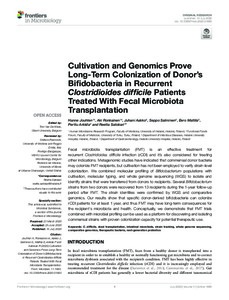Cultivation and Genomics Prove Long-Term Colonization of Donor's Bifidobacteria in Recurrent Clostridioides difficile Patients Treated With Fecal Microbiota Transplantation
Hanne Jouhten; Aki Ronkainen; Juhani Aakko; Seppo Salminen; Eero Mattila; Perttu Arkkila; Reetta Satokari
Cultivation and Genomics Prove Long-Term Colonization of Donor's Bifidobacteria in Recurrent Clostridioides difficile Patients Treated With Fecal Microbiota Transplantation
Hanne Jouhten
Aki Ronkainen
Juhani Aakko
Seppo Salminen
Eero Mattila
Perttu Arkkila
Reetta Satokari
FRONTIERS MEDIA SA
Julkaisun pysyvä osoite on:
https://urn.fi/URN:NBN:fi-fe2021042824345
https://urn.fi/URN:NBN:fi-fe2021042824345
Tiivistelmä
Fecal microbiota transplantation (FMT) is an effective treatment for recurrentClostridioides difficileinfection (rCDI) and it's also considered for treating other indications. Metagenomic studies have indicated that commensal donor bacteria may colonize FMT recipients, but cultivation has not been employed to verify strain-level colonization. We combined molecular profiling ofBifidobacteriumpopulations with cultivation, molecular typing, and whole genome sequencing (WGS) to isolate and identify strains that were transferred from donors to recipients. SeveralBifidobacteriumstrains from two donors were recovered from 13 recipients during the 1-year follow-up period after FMT. The strain identities were confirmed by WGS and comparative genomics. Our results show that specific donor-derived bifidobacteria can colonize rCDI patients for at least 1 year, and thus FMT may have long-term consequences for the recipient's microbiota and health. Conceptually, we demonstrate that FMT trials combined with microbial profiling can be used as a platform for discovering and isolating commensal strains with proven colonization capacity for potential therapeutic use.
Kokoelmat
- Rinnakkaistallenteet [29335]
